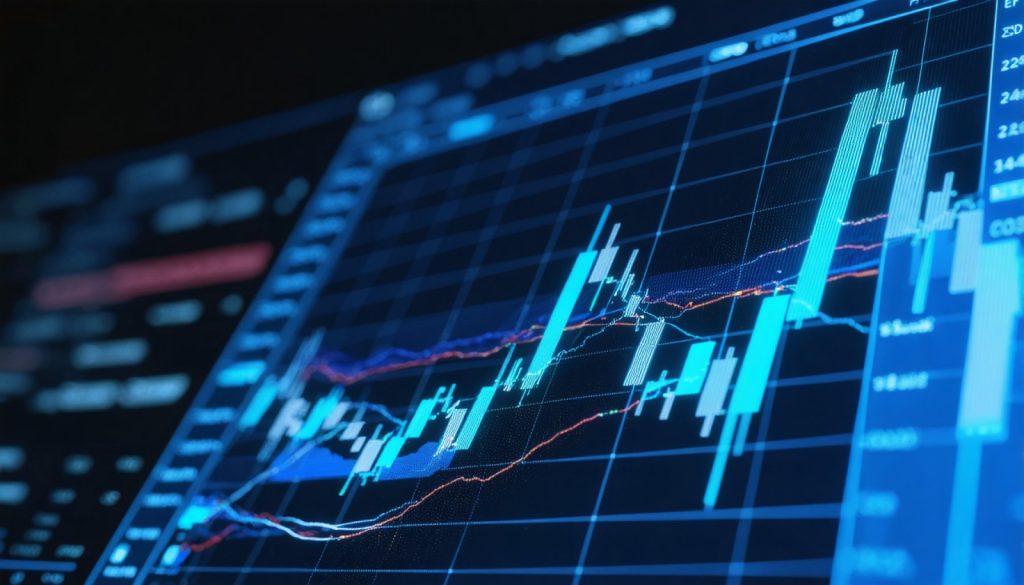
- The removal of U.S. tariffs on crucial electronic imports spurred optimism in European markets, particularly boosting technology shares.
- Key European semiconductor companies, such as ASM International, Infineon, and ASML, saw share increases of around 2% due to better access to the U.S. market.
- American tech stocks traded in Europe, including Apple, Nvidia, and Dell, experienced significant gains, with Apple’s stock rising over 6% in Frankfurt.
- Despite the positive market response, President Trump’s comments hinted at potential future tariffs on semiconductors, adding an element of uncertainty.
- Europe’s tech index showed a 2.8% rise, with companies like Logitech and SAP seeing stock increases of 5% and 2%, respectively.
- Nasdaq futures indicated a 1.6% uplift, suggesting a strong trading day ahead in New York.
A wave of optimism surged across European markets on Monday as the United States announced the removal of tariffs on vital electronic imports, emboldening technology shares on the continent. Brightly lit trading floors crackled with excitement, particularly for companies deeply intertwined with the American consumer electronics scene.
European semiconductor giants, like ASM International, Infineon, and ASML, basked in the glow of this decision. As the early winter sun streamed through financial districts in places like Amsterdam and Munich, shares in these firms leaped about 2%, propelled by the prospect of unobstructed access to the lucrative U.S. market. These companies play an integral role in churning out the microchips that power everything from sleek smartphones to high-powered computers.
Meanwhile, across the Atlantic, the titans of technology were experiencing an equally favorable morning. Apple’s stock, buoyed by renewed investor confidence, surged over 6% at one point in Frankfurt. The impressive rally was mirrored by other American tech behemoths traded in Europe, with Nvidia and Dell climbing 3% and 6.3% in value, respectively.
But even as markets reveled in the newfound relief, the shadow of unpredictability lingered on the horizon. President Trump’s recent remarks painted a picture of potential turbulence, as he hinted at the possibility of fresh levies targeting semiconductors and the broader supply chain.
In the wake of these announcements, Europe’s tech index reflected a positive 2.8% rise. Companies like Logitech exhibited vigor with a 5% hike, while tech powerhouses SAP and Dassault Systemes were not far behind, each lifting investors’ spirits with a 2% increase in their stock values.
The broader impact rippled through financial markets, as Nasdaq futures saw a promising 1.6% uplift during early European hours, paving the way for a potentially robust trading day in New York.
In this dynamic confluence of hope and heedfulness, one clear lesson emerges: the thrilling dance of markets, influenced by international policies, underscores the delicate balance between opportunity and uncertainty. As the gears of global trade continue to turn, investors must navigate these waters with both strategy and caution.
Unlocking Europe’s Tech Stock Surge: What You Need to Know Now
European Tech Firms Thrive Amid U.S. Tariff Removal
The recent announcement by the United States to lift tariffs on key electronic imports has injected a wave of optimism into European markets, specifically among technology sectors. This decision has notably impacted European semiconductor leaders like ASM International, Infineon, and ASML, whose stocks have seen appreciable gains due to potential unfettered access to the U.S. market.
Unpacking the Details
Semiconductor Dominance: Companies such as ASML and Infineon are pivotal in the semiconductor industry, producing essential microchips for various tech products. Their strategic position in the supply chain means that any tariff changes can significantly influence their market performance.
Market Reactions: Leading tech companies, including Apple, Nvidia, and Dell, witnessed substantial stock price increases, reflecting renewed investor confidence. Apple’s stock, in particular, saw a sharp increase, showcasing the direct impact of global trade decisions on tech giants.
Pressing Questions and Considerations
1. What Are the Long-Term Implications for Investors?
– Market Volatility: While the short-term outlook appears positive, investors should remain cautious of potential market volatility, especially with the possibility of new tariffs in the semiconductor sector.
2. How Do International Relations Influence Tech Stocks?
– Trade Relations: Stock markets globally react swiftly to changes in international trade policies. Investors must stay informed about geopolitical developments, as these can have immediate effects on stock valuations and trading behaviors.
The European Tech Market Landscape
Consumer Electronics Demand: Demand for consumer electronics remains robust, driving growth for semiconductor firms. As tech becomes increasingly integrated into daily life, companies supplying critical components are poised for sustained success.
Emerging Trends: The shift toward 5G technology and the Internet of Things (IoT) is expected to further buoy the European tech sector, creating opportunities for long-term growth and innovation.
Actionable Recommendations for Investors
– Diversify Holdings: Diversify investments across various tech sectors to manage risks associated with geopolitical shifts.
– Stay Informed: Regularly monitor geopolitical news and market analyses to make informed investment decisions.
– Consider Emerging Tech: Explore investment opportunities in emerging technologies like AI and IoT, which are set to redefine the landscape of consumer electronics and beyond.
Closing Thoughts
Navigating the current global trade environment requires both strategic insight and flexibility. By understanding the interconnected nature of international markets and keeping abreast of economic trends, investors can position themselves to capitalize on new opportunities while mitigating risks.
For more insights and expert analyses on European markets and investment strategies, visit Financial Times.



